
The ghazal is a form of amatory poem or ode, originating in Arabic poetry. Ghazals often deal with topics of spiritual and romantic love and may be understood as a poetic expression of both the pain of loss or separation from the beloved and the beauty of love in spite of that pain.

Jagjit Singh was an Indian composer, singer and musician. He composed and sang in numerous languages and is credited for the revival and popularity of ghazal, an Indian classical art form, by choosing poetry that was relevant to the masses and composing them in a way that laid more emphasis on the meaning of words and melody evoked by them. In terms of Indian classical music, his style of composing and gayaki (singing) is considered as Bol-pradhan, one that lays emphasis on words. He highlighted this in his music for films such as Prem Geet (1981), Arth (1982), and Saath Saath (1982), and TV serials Mirza Ghalib (1988) and Kahkashan (1991). Singh is considered to be the most successful ghazal singer and composer of all time in terms of critical acclaim and commercial success. With a career spanning five decades and many albums, the range and breadth of his work has been regarded as genre-defining.

Talat Aziz is a ghazal singer and actor.

Kaifi Azmi was an Indian Urdu poet. He is remembered as the one who brought Urdu literature to Indian motion pictures. Together with Pirzada Qasim, Jaun Elia and others he participated in many memorable Mushaira gatherings of the twentieth century. He was also a communist who wanted to see India one day become a socialist state. His wife was theatre and film actress Shaukat Kaifi.
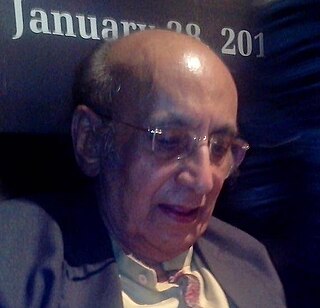
Muqtida Hasan Nida Fazli, known as Nida Fazli, was a prominent Indian Hindi and Urdu poet, lyricist and dialogue writer. He was awarded the Padma Shri in 2013 by the government of India for his contribution to literature.
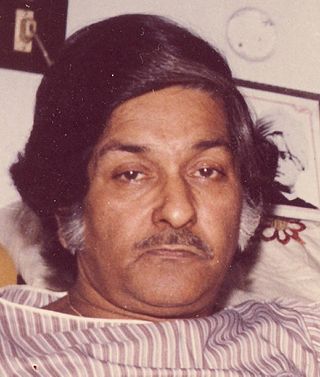
Sunil Ganguly was an Indian instrumentalist from Kolkata. He popularized the Hawaiian electric guitar in India. He made several albums with HMV India, Concorde Records, and Sagarika, with instrumental renditions of Hindi film music, classical songs, Bengali film songs, modern songs, Nazrul Geeti, Rabindra Sangeet, and ghazals by composers like Mehdi Hassan, Ghulam Ali, Jagjit Singh, and Bade Ghulam Ali,.
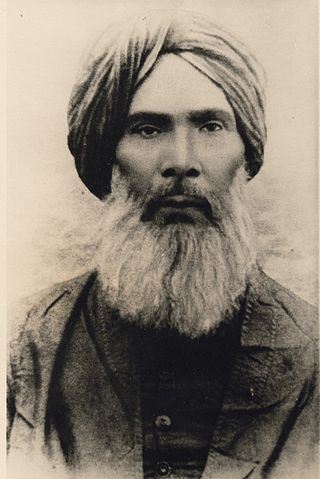
Ameer Minai or Amir Meenai was a 19th-century Indian Urdu poet. He was respected by several contemporary poets including Ghalib and Daagh Dehalvi and by Muhammad Iqbal. He wrote in Urdu, Persian and Arabic.
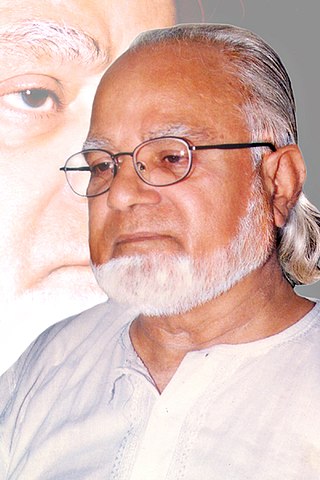
Muzaffar Warsi was a Pakistani poet, essayist, lyricist, and a scholar of Urdu. He began writing more than five decades ago. He wrote a rich collection of na`ats, as well as several anthologies of ghazals and nazms, and his autobiography Gaye Dinon Ka Suraagh. He also wrote quatrains for Pakistan's daily newspaper Nawa-i-Waqt.

Balwant Gargi was an Indian Punjabi language dramatist, theatre director, novelist, short story writer, and academic.
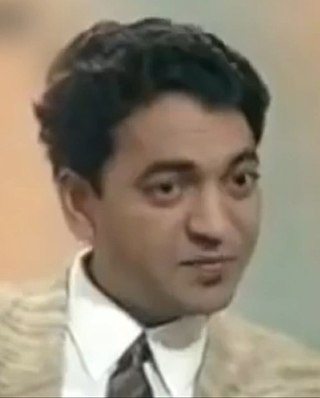
Shiv Kumar Batalvi was an Indian poet, writer and playwright of the Punjabi language. He was most known for his romantic poetry, noted for its heightened passion, pathos, separation and lover's agony, due to that he was also called Birha Da Sultan.He is also called 'John Keats of punjab'.
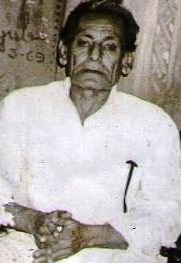
Kaif Bhopali was an Indian Urdu poet and lyricist. He was a poet in the Urdu mushaira circles, and is known as the writer of songs like Chalo Dildar Chalo, sung by Mohammed Rafi in Kamal Amrohi's 1972 classic, Pakeezah.
Sukhdarshan Dhaliwal (1950–2015) was a Punjabi-American poet, who has published three collections of poetry in Punjabi and one collection of ghazals in English.

Lal Singh Dil was one of the major revolutionary Punjabi poets emerging out of the Naxalite (Marxist-Leninist) Movement in the Indian Punjab towards the late sixties of the 20th century. The Movement was a political failure and died down quickly, but it brought in revolutionary changes in the subject matter, language and idiom, tone and tenor of Punjabi poetry. Referring to the impact of the Naxalite Movement in Punjab, sociologist Paramjit S. Judge says, "The consequences of the Naxalite movement have been almost ephemeral and have hardly made an impact on the social and political spheres... Its positive contribution is that it has revolutionized Punjabi poetry which can never be traditional and romantic again." "The prominent poets belonging to this school are: Pash, Lal Singh Dil, Harbhajan Halvarvi, Darshan Khatkar, Amarjit Chandan and Sant Ram Udasi," says Paramjit S Judge. Prof Ronki Ram called him "one of the most popular and serious poets of the Naxal Movement in Punjab of the late 1960s."

Ibrahim Khan Ghauri was an Indian Hindi and Urdu poet, journalist, actor and film lyricist. He wrote under the pen name Ashk. He is popular for his lyrics in Hritik Roshan's debut film, Kaho Naa Pyaar Hai. Ashk is well known as a lyricist, and script writer of some well-known films and TV serials. He wrote more than 700 ghazals that were sung by various popular ghazal singers such as Talat Aziz, Jagjit Singh, Chandan Das, Pankaj Udhas, Penaz Masani, Anuradha Paudhwal, Bhupinder Mitali and others in the 80s and 90s.
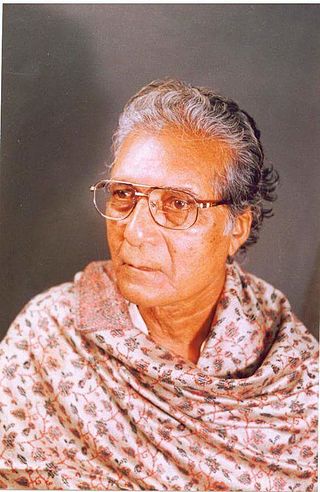
Shahid Kabir was an Urdu language poet and writer from Maharashtra, India. He was an active writer from 1952, writing poetry, short stories and articles. He was well-known mainly for his ghazals. His significant works include Kachchi Deewaren, Charon Aour and Pehchaan. He was recognised by the Maharashtra State Urdu Academy. His ghazals have been sung by several Indian singers including Jagjit Singh, Chitra Singh, Hariharan, Chandan Dass, Munni Begum Shishir Parkhie and Sabri brothers.

Amarjit Chandan is a Punjabi writer, editor, translator and activist. He has written eight collections of poetry and five collections of essays in Punjabi. He has been called "the global face of modern Punjabi poetry".

Aalok Shrivastav is an Indian poet, lyricist and journalist. His critically acclaimed works include Aameen (2007), a poetry collection and Afreen (2012), a story collection, both published by Rajkamal Prakashan. Aalok's works have won a number of accolades for his works, including the International Pushkin Award and Dushyant Kumar Award by Madhya Pradesh Sahitya Akademi.
















